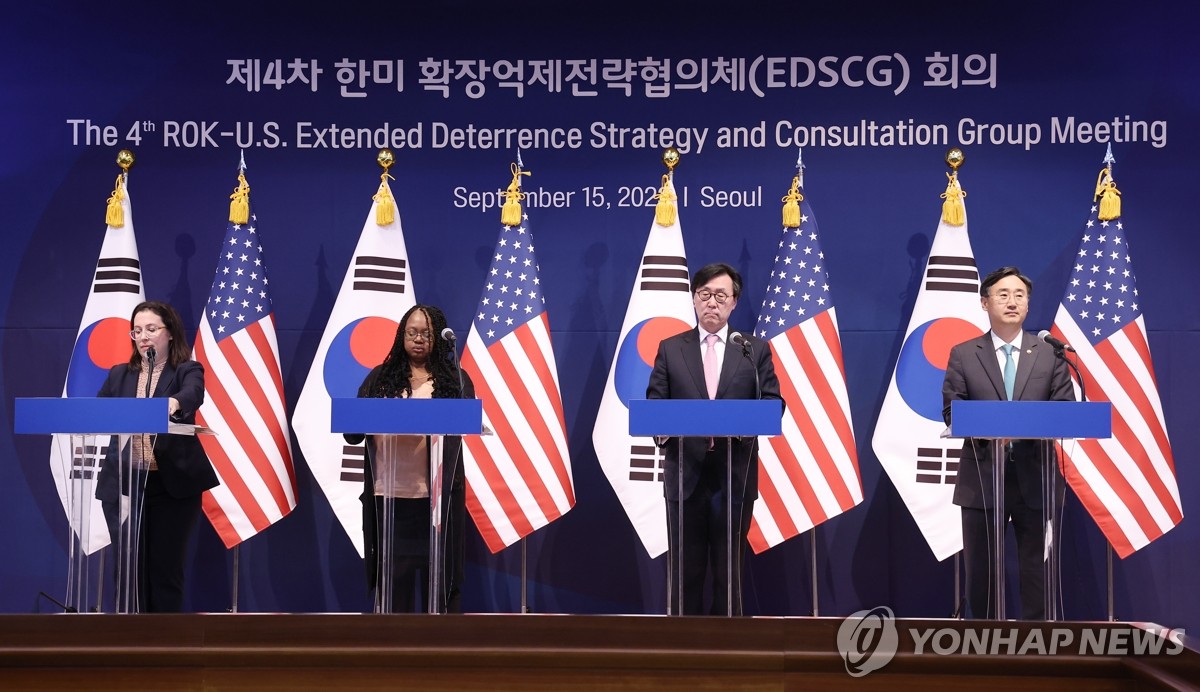- California Assembly OKs highest minimum wage in nation
- S. Korea unveils first graphic cigarette warnings
- US joins with South Korea, Japan in bid to deter North Korea
- LPGA golfer Chun In-gee finally back in action
- S. Korea won’t be top seed in final World Cup qualification round
- US men’s soccer misses 2nd straight Olympics
- US back on track in qualifying with 4-0 win over Guatemala
- High-intensity workout injuries spawn cottage industry
- CDC expands range of Zika mosquitoes into parts of Northeast
- Who knew? ‘The Walking Dead’ is helping families connect
S. Korea, U.S. warn Pyongyang, Moscow’s military cooperation violates UNSC resolutions
South Korea and the United States warned that military cooperation between North Korea and Russia is a violation of U.N. Security Council resolutions and will come at a cost during a high-level deterrence dialogue Friday, just days after the leaders of Pyongyang and Moscow held a rare summit meeting.
The fourth meeting of the Extended Deterrence Strategy and Consultation Group (EDSCG), a gathering of the allies’ vice-ministerial defense officials and diplomats, took place in Seoul’s foreign ministry amid concerns Pyongyang and Moscow may have discussed a potential arms deal at the recent summit.
“The recent reports about the potential sale of arms between North Korea and Russia are concerning and any such transfer of arms would be a violation of U.N. Security Council resolutions,” Bonnie Jenkins, under secretary of state for arms control and international security, said during a press conference after the meeting.
The meeting was led by Seoul’s vice foreign and defense ministers, Chang Ho-jin and Shin Beom-chul, respectively, from the South Korean side, while the U.S. side was headed by Jenkins and Sasha Baker, deputy under secretary of defense for policy.

The U.S. reaffirms any nuclear attack by the North against Washington or its allies, including South Korea, would be “unacceptable and result in the end of that regime,” Jenkins said.
She added that the two sides strongly condemned the escalation of North Korea-Russia defense and political cooperation and discussed how to counter Russia’s facilitation of the North’s unlawful nuclear and missile programs, as well as its assistance in Russia’s illegal war efforts in Ukraine.
On the Taiwan Strait issue, Jenkins expressed appreciation toward the South Korean government for repeatedly underscoring the importance of peace and stability in the region.
Seoul’s Vice Foreign Minister Chang Ho-jin also said the two sides agreed on the need to make North Korea and Russia “pay their price” for military cooperation, calling on Russia to “act responsibly” as a permanent member of the U.N. Security Council.
Chang said the two sides agreed to operate the EDSCG, along with the South Korea-U.S. Nuclear Consultative Group (NCG), in a “complementary” manner to strengthen the allies’ extended deterrence efforts.
Addressing concerns over trilateral cooperation among North Korea, China and Russia, he said Beijing most likely sees “no need to share its overwhelming influence” with Russia.
After the second meeting in 2018, the EDSCG was suspended due to the then liberal Moon Jae-in administration’s push for an initiative to promote inter-Korean rapprochement and cooperation.
The reactivation of the EDSCG came after South Korean President Yoon Suk Yeol and his U.S. counterpart, Joe Biden, agreed on it during their summit in May of last year as part of joint efforts to address Pyongyang’s growing nuclear and missile threats.











